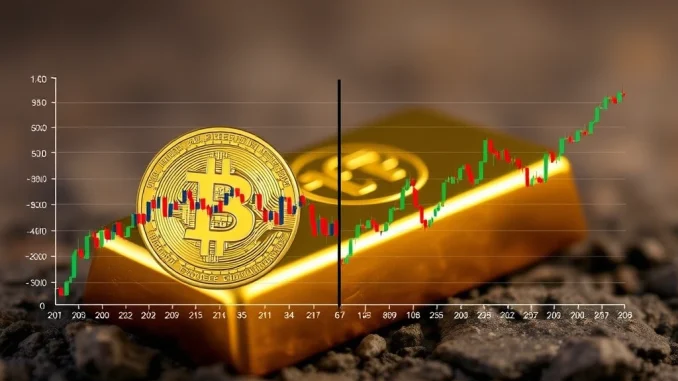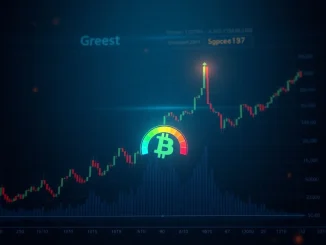
Is Bitcoin the ‘digital gold’ we’ve been told it is? For years, the narrative has painted Bitcoin as a safe haven asset, a hedge against inflation, and a modern equivalent to gold. But recent findings are shaking up this perception. Franklin Templeton Digital Assets has dropped a bombshell report revealing a surprising truth: Bitcoin correlation is significantly stronger with tech stocks than with the precious metal itself. Let’s dive deep into what this means for investors and the future of cryptocurrency.
Decoding the Bitcoin Correlation with Tech Stocks
The report from Franklin Templeton Digital Assets highlights a fascinating trend: Bitcoin’s price movements are increasingly aligned with the tech sector, particularly the Nasdaq. The correlation coefficient, a statistical measure of how closely two assets move together, is telling. Bitcoin’s correlation with the Nasdaq has surged to a notable 0.7. To put this into perspective, a correlation of 1 means assets move perfectly in sync, while 0 indicates no linear relationship. A 0.7 correlation suggests a strong positive relationship, meaning Bitcoin and tech stocks often rise and fall together.
Why is this significant? It challenges the long-held belief that Bitcoin behaves like ‘digital gold,’ a safe haven in times of economic uncertainty. If Bitcoin is mimicking the volatile tech sector, its role as a portfolio diversifier and inflation hedge comes into question.
Key Takeaways on Bitcoin and Tech Stock Correlation:
- Strong Correlation: Bitcoin’s correlation with tech stocks, particularly the Nasdaq, reaches up to 0.7.
- Tech Sector Influence: Bitcoin’s price movements are increasingly influenced by factors affecting the tech industry.
- Investment Strategy Implications: Investors should consider Bitcoin as potentially more aligned with growth assets than safe havens.
The Weakening ‘Digital Gold’ Narrative
Conversely, the report reveals a much weaker correlation between Bitcoin and gold. Rarely exceeding 0.3, the correlation coefficient suggests a largely independent price movement between these two assets. This is a critical departure from the ‘digital gold‘ narrative that has been a cornerstone of Bitcoin’s appeal to many investors.
The ‘digital gold‘ argument rests on the idea that Bitcoin, like gold, is a scarce, decentralized asset that can store value and act as a hedge against traditional market volatility and inflation. However, Franklin Templeton’s analysis suggests this narrative might be losing its grip.
Why Bitcoin Isn’t Behaving Like Gold:
- Volatility: Bitcoin’s inherent volatility makes it a riskier asset compared to gold, which is traditionally seen as a stable store of value.
- Regulatory Exposure: The cryptocurrency market is still navigating a complex and evolving regulatory landscape, adding uncertainty and influencing price swings.
- Speculative Nature: Bitcoin’s price is often driven by speculation and market sentiment, similar to tech stocks, rather than purely by its intrinsic value as a store of value.
Contrasting Reactions: Bitcoin vs. Gold in Recent Market Events
Recent market events further illustrate the diverging paths of Bitcoin and gold. When the Producer Price Index (PPI) data came in lower than expected, Bitcoin experienced a significant rebound, surging above $83,000. This reaction aligns more closely with tech stocks, which often rally on positive economic data or dovish signals from central banks.
Meanwhile, gold’s price action was driven by different factors. Amid rising U.S.-China trade tensions, gold hit a record high of $3,236. Gold’s surge reflects its traditional role as a safe haven asset, sought after during geopolitical uncertainty and economic turmoil. This independent price movement further underscores the differing nature of Bitcoin and gold as investments.

Is Bitcoin Still a Valuable Investment?
The shifting correlation doesn’t necessarily diminish Bitcoin’s value proposition, but it does require a recalibration of investor expectations. Instead of viewing Bitcoin solely as ‘digital gold,’ it might be more accurate to consider it as a high-growth, albeit volatile, tech-adjacent asset.
Actionable Insights for Investors:
- Re-evaluate Portfolio Allocation: If you’re holding Bitcoin as a safe haven asset, consider its correlation with tech stocks and adjust your portfolio accordingly.
- Understand Risk Profile: Bitcoin’s volatility and tech-sector alignment make it a higher-risk investment compared to gold.
- Monitor Tech Market Trends: Keep an eye on tech industry trends and Nasdaq performance, as these factors may increasingly influence Bitcoin’s price.
- Diversification Remains Key: Regardless of Bitcoin’s correlation, diversification across different asset classes remains a prudent investment strategy.
Conclusion: The Evolving Narrative of Bitcoin
The report from Franklin Templeton Digital Assets presents a compelling case for rethinking Bitcoin’s place in the investment landscape. While the ‘digital gold‘ narrative has been powerful, the data suggests that Bitcoin’s price behavior is becoming increasingly intertwined with the tech sector. This shocking revelation doesn’t negate Bitcoin’s potential, but it calls for a more nuanced understanding of its characteristics and correlations. As the cryptocurrency market matures, continuous analysis and adaptation will be crucial for investors navigating this dynamic asset class. The future of Bitcoin may be less about mimicking gold and more about forging its own path within the ever-evolving world of technology and finance.



